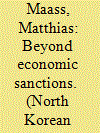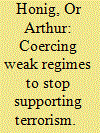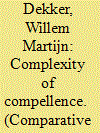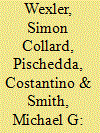| Srl | Item |
| 1 |
ID:
109215


|
|
|
|
|
| Publication |
2011.
|
| Summary/Abstract |
In 2010, Taiwan's president, Ma Ying-jeou, explained the rationale for his country signing a major economic cooperation treaty with mainland China with the following statement: "We can handle diplomatic isolation, but economic isolation is fatal." This essay will make the argument that in the case of North Korea, the opposite is true: Economic isolation appears fairly manageable for Pyongyang, but diplomatic sanctions may in fact enhance a broad coercive strategy significantly.
This argument will be framed within the broader claim that in particular in the case of North Korea, sanctions have been conceptualized too narrowly-they have been viewed as economic coercion only. Instead, the argument is made that sanctioning states should consider the entire spectrum allowed under Chapter VII, Article 41 of the UN Charter.
The discussion in this article will be limited to the case of North Korea for reasons of space and the urgent need to address the deteriorating security situation on the Korean Peninsula, given the country's rise to quasi-nuclear power status. In light of this development, the sanctions regime currently in place needs to be reevaluated. A reorientation towards diplomatic sanctions will allow for a broader coercive strategy that is mindful of nuclear deterrence but goes beyond economic sanctions, which have not been successful in restricting Pyongyang's military-strategic objectives.
|
|
|
|
|
|
|
|
|
|
|
|
|
|
|
|
| 2 |
ID:
122299


|
|
|
|
|
| Publication |
2013.
|
| Summary/Abstract |
Scholars tend to pessimistically argue that the weaker a regime is the harder it becomes for international actors to coerce it to fight the terrorist groups that it harbors/sponsors, since weak regimes are afraid that taking such an unpopular step could critically undermine their stability. Yet, this argument ignores the policy option that the coercing actor has of threatening to take steps which would undermine the stability of the weak regime unless it ceases its support for terrorist groups. Such a regime-threatening coercive strategy can overcome the problem of the weak regime's lack of political incentives because if the threat is credible, even a weak regime may conclude that it is politically cheaper to suppress the terrorists than face an externally triggered regime destabilization. Since weak regimes often care more about their survival than about national security interests, the regime-threatening coercive strategy has the best chances for success against such regimes. This article presents three different regime-threatening military coercive strategies and explores the conditions under which they are likely to be successful.
|
|
|
|
|
|
|
|
|
|
|
|
|
|
|
|
| 3 |
ID:
101732


|
|
|
|
|
| Publication |
2010.
|
| Summary/Abstract |
Robert A. Pape's denial theory forms the best corroborated theory to guide coercive strategy. Denial theory, however, provides a fundamentally flawed causal model because it neglects the complexity of the causal dynamics of compellence on two accounts: it fails to address strategic interaction between opponents and it seeks to provide a univariate explanation for a multicausal phenomenon. To address these two weaknesses, a new theory of grand strategic denial is developed. The implication of this new theory is that it is the target's grand strategy that must be undermined, not its military strategy per se.
|
|
|
|
|
|
|
|
|
|
|
|
|
|
|
|
| 4 |
ID:
132322


|
|
|
|
|
| Publication |
2014.
|
| Summary/Abstract |
The phenomenon of suicide attacks has dramatically expanded over the last twenty years, rising from no events in 1980 to a total of 1,398 events by 2008. A prominent theory has argued that suicide attacks are a coercive strategy aimed at ending foreign military occupation by democracies. Yet these conclusions are based on a research design that is affected by selection bias and that fails to distinguish foreign occupations from cases of groups seeking independence or autonomy, which we term domestic occupations. Analyzing an original data set that distinguishes the different types of occupation, we find that only foreign occupations have a strong and consistent effect on the incidence of suicide attacks. The reason, we argue, is that suicide attacks only become cost effective when targets are both hardened and accessible, a strategic environment that is more common to civil wars and foreign occupations than to domestic occupations.
|
|
|
|
|
|
|
|
|
|
|
|
|
|
|
|